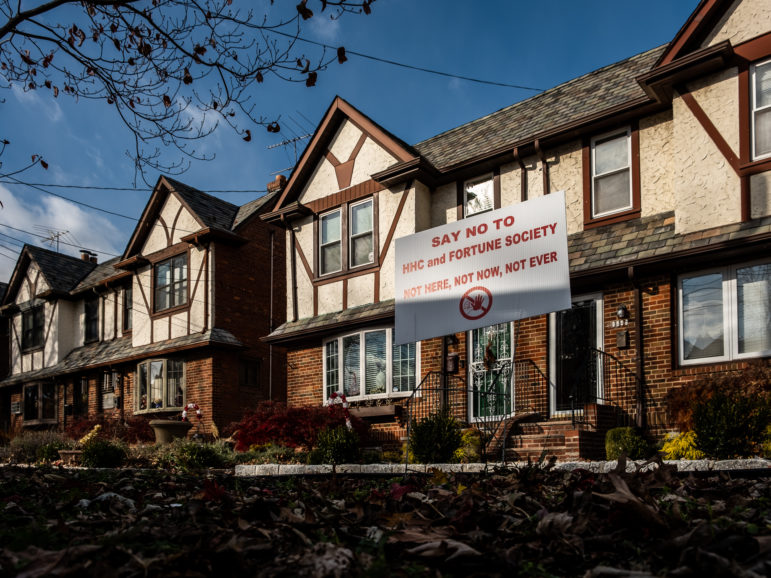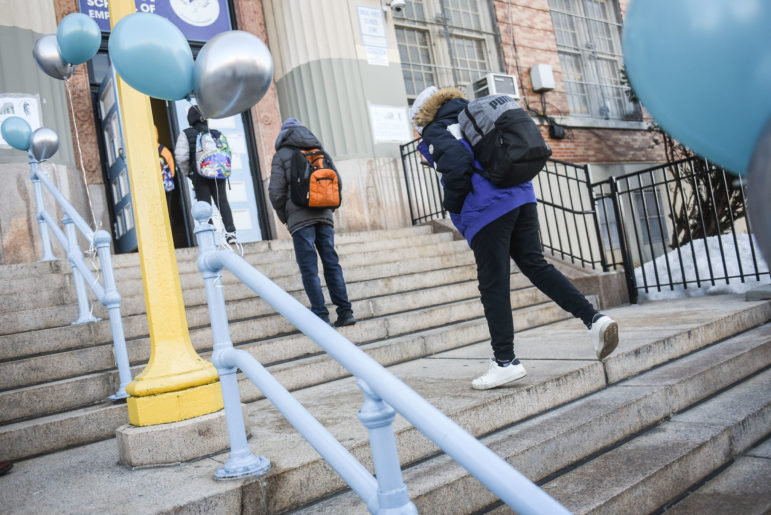In the working-class neighborhood of Fordham, where Dominican immigrants have been pouring in steadily for decades, there are no movie theaters or bars.
But at least 11 money-transfer businesses have sprouted along a 10-block swath of the Grand Concourse, most of them in the past two years, waging an intense battle for the neighborhood’s “remesas” – remittances of immigrants’ income to their families in their home countries.
Customers like Raul Rojas, a 28 year-old construction worker from Mexico who arrived in the Bronx three years ago, are especially sought after. Every month, he dutifully lines up at Delgado Travel to send $400 to his wife and two children in Mexico. He said he makes $1,600 a month and doesn’t mind paying the 4 percent commission – in his case, $16 – to Delgado Travel: he wants to make sure the money arrives safely.
Neighborhood businesses are desperately reaching for loyal, repeat customers like Rojas – some poor and recently arrived, others grappling with leaving their families behind. Transfer costs have plummeted in the past seven years thanks to the surge in competition, while the dollar amount of remittances has grown steadily at the national level for the past decade.
Latin American immigrants in the United States are expected to send about $45 billion home this year, up from $14 billion in 2001, according to the Washington, D.C.-based Inter-American Development Bank, which fosters development in Latin America. In 2006, about $300 million in remittances left New York for Latin American countries each month, placing it third among all states behind California and Texas.
But despite the booming market, the playing field isn’t level on the Grand Concourse – smaller, independent businesses are resorting to cutthroat tactics to compete against well-established chains.
“The money transfer industry is facing serious problems,” said Manuel Orozco, executive director of the remittances project at the Inter-American Dialogue, a Washington policy center.
Most small businesses are not making money, having cut their rates to a minimum to stay alive, he said. “It’s an industry that is consolidating at a very fast speed. There are about 1,000 money transfer companies competing against each other.”
Giants such as Western Union, with 285,000 worldwide locations, still rack up billions in revenue and are unfazed by the rate wars. In Fordham, at least eight agents send money through Western Union – at these stores, the average cost of sending $400 to Mexico is $20.
“We welcome competition,” said Western Union spokeswoman Kristin Kelly. “It’s good for the industry, it’s good for our business and it’s good for consumers.”
But smaller players, such as Teleremesa on 182nd Street and Grand Concourse, aren’t faring so well. Osvaldo Perez, who has managed the business for a decade, said that in the beginning he would get about 130 customers each day. Today he’s lucky if he gets 60. As competition heated up, he was forced to bring his prices down – from $5 plus 5 percent of every money transfer to the Dominican Republic, to a flat rate of $5.
His customers aren’t coming back. Via Travel, only two blocks away, is offering free transfers to the Dominican Republic for amounts up to $100. “How do they pay rent, pay their employees, how do they pay taxes?” asked Perez, who says his profits have dipped significantly.
The “free” transfers are just a marketing ploy, said Boris Martinez, manager at the Fordham branch of Nick Lugo Travel, a newer entrant into the local market.
“They take a commission when they exchange dollars to pesos. That’s why it’s free,” Martinez said. “It’s better to just pay the costs up front.” He now offers transfers to the Dominican Republic for $2, lower than most other neighborhood businesses.
Every time a remittance is sent, revenues are split between three parties: the company that takes the transaction, an agent in the U.S., and an agent in the receiving country.
About $2.6 billion was sent from the U.S. to the Dominican Republic in 2005, a 40 percent increase over 2001. But even though the price wars have brought savings to Fordham’s 10,000-strong Dominican community, costs for transfers to Mexico – with a thriving market of 1,500 neighborhood residents – have not decreased as drastically.
It cost a nationwide average of $28.16 to send $300 to Mexico in 1999, according to a study by the Mexican government’s Center for Public Finance Studies. In 2005, the cost was down to an average of $10.64. In Fordham, prices linger around that average.
But the competition for Mexican customers is on the rise. Mexicans in the U.S. sent out about $20 billion in remittances to their homeland last year, more than doubling the amount sent in 2001.
At Jayson Multi Service, manager Leonarda Cruz recently rolled out a Mexico-only special, charging customers a flat fee of $15 for transfers up to $2,000. She gets an average of eight customers a day, she said.
She’s having trouble contending with giant Delgado Travel, with about 300 branches across the country, which attracts most Mexican customers in the neighborhood. Delgado still charges a percentage fee, which most businesses in Fordham have dropped – but it’s managed to become a mainstay for the area’s Mexican immigrants.
A van hawking Mexican food is parked outside the store at 184th Street and Grand Concourse during the day. After making their transfers, many customers spring for a beef taco piled with guacamole or a hot enchilada.
The extra cost of sending money through Delgado is not a problem, customers said, because it is perceived as the most reliable company. Ignacio Arellano, 43, uses Delgado Travel to send about $300 to his wife and three children in Mexico whenever he gets the chance. He washes dishes at a restaurant and hasn’t seen his family in five years.
“It’s safer,” he said. Sending money through the company gives him peace of mind, he added.
The money-transfer businesses that can’t afford to join the price battle have changed their focus. Some owners make ends meet by selling cell phones, electronics and insurance.
And others, like Edwin Guerrero of Mi Gente Multiservices, are clinging to the hope that word-of-mouth and good customer service will help them stay afloat. “There’s always going to be competition,” Guerrero said. “Whoever does things right, stays.”









